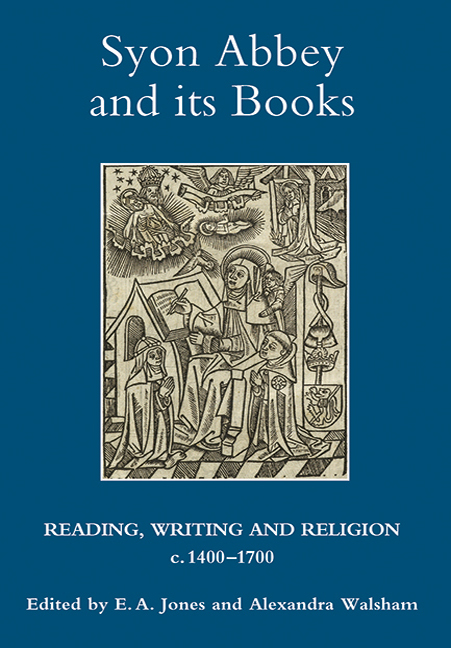Book contents
- Frontmatter
- Contents
- List of Illustrations
- Acknowledgments
- Notes on Contributors
- List of Abbreviations
- Syon Abbey: An Outline Chronology
- Introduction: Syon Abbey and its Books: Origins, Influences and Transitions
- I Brothers and Sisters
- II Syon Abbey and the Book Trade
- 3 Syon and the English Market for Continental Printed Books: The Incunable Phase
- 4 ‘Moche profitable unto religious persones, gathered by a brother of Syon’: Syon Abbey and English Books
- III The Bridgettines in Exile
- IV History and Memory
- Appendix Syon Abbey's Books at the University of Exeter
- Index
- Miscellaneous Endmatter
3 - Syon and the English Market for Continental Printed Books: The Incunable Phase
from II - Syon Abbey and the Book Trade
Published online by Cambridge University Press: 09 May 2017
- Frontmatter
- Contents
- List of Illustrations
- Acknowledgments
- Notes on Contributors
- List of Abbreviations
- Syon Abbey: An Outline Chronology
- Introduction: Syon Abbey and its Books: Origins, Influences and Transitions
- I Brothers and Sisters
- II Syon Abbey and the Book Trade
- 3 Syon and the English Market for Continental Printed Books: The Incunable Phase
- 4 ‘Moche profitable unto religious persones, gathered by a brother of Syon’: Syon Abbey and English Books
- III The Bridgettines in Exile
- IV History and Memory
- Appendix Syon Abbey's Books at the University of Exeter
- Index
- Miscellaneous Endmatter
Summary
A book is a fragile creature, it suffers the wear of time, it fears rodents, the elements, clumsy hands. If for a hundred and a hundred years everybody had been able freely to handle codices, the majority of them would no longer exist. So the librarian protects them not only against mankind, but also against nature, and devotes his life to this war against the forces of oblivion, the enemy of truth.
Abbot Abo, in Umberto Eco, The Name of the RoseIn a letter to Archbishop Matthew Parker written in July 1560, John Bale spoke of the years leading up to 1540, which he called the ‘tyme of the lamentable spoyle of the lybraryes of Englande’, when he saw the collections of suppressed religious houses broken up for resale or for use as binding fragments, scrap paper, ‘in stacyoners and boke bynders store howses, some in grosers, sopesellars, taylers, and other occupyers shoppes, some in shyppes ready to be carryed over the sea into Flaunders to be solde’. If such books were indeed exported to Flanders in the years after the suppression, then in many cases they would have been retracing the route by which they had entered England in the first place, especially if they were printed books. The established trade route of the Rhine, Flanders and Antwerp happened to link together the major centres of the new technology – Basel, Mainz, Strasbourg, Cologne, and the Low Countries – whose trade with England was dominated by the members of the Merchant Adventurers company: men like William Wilcocks, Roger Thorney and, of course, William Caxton, who also played a significant role in the new ‘Latin trade’ in imported continental printed books. From very soon after the invention of commercial printing, England had been a good market for the new commodity. This market included not only liturgical books (printed abroad in substantial numbers for the English market) and devotional books, but also Latin works of theology, philosophy, canon law, grammar and classical learning, aimed at and bought by the students or, more probably, the teachers at the great universities of Oxford and Cambridge and also by scholars and teachers in the great schools and monastic centres of learning with which fifteenth-century England was so richly endowed.
- Type
- Chapter
- Information
- Syon Abbey and its BooksReading, Writing and Religion, c.1400-1700, pp. 104 - 128Publisher: Boydell & BrewerPrint publication year: 2010



